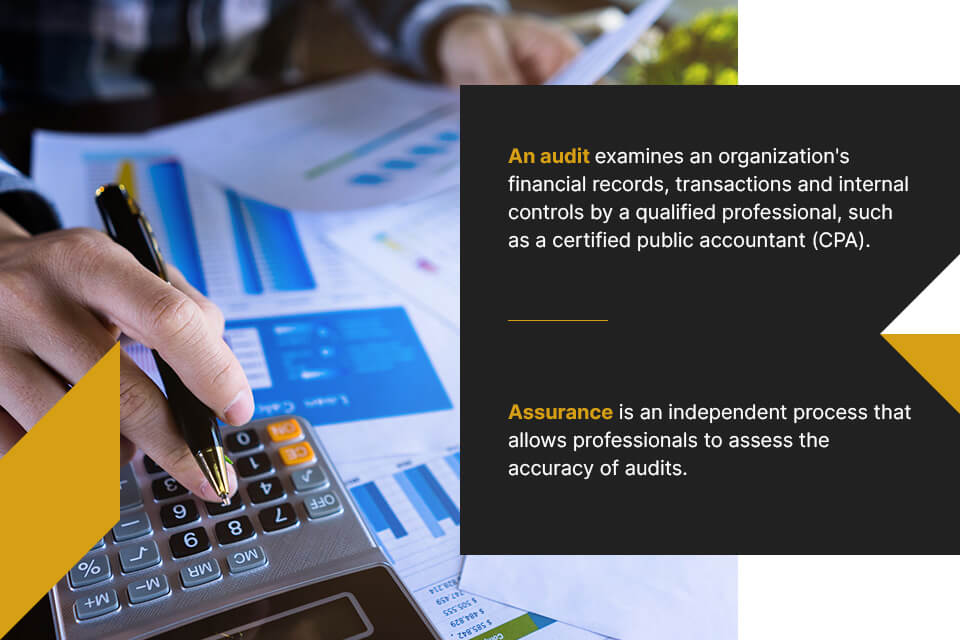Auditing vs. Assurance Services: Is There a Difference?

Many people use auditing and assurance interchangeably. Accounting firms often group these services together, as assurance typically comes directly after auditing.
Although the processes are largely interrelated, there are apparent differences. The distinctions lie in their nature, purpose, use and scope. Additionally, the people who perform audit and assurance services may differ in some ways.
Because both services are integral to business operations, it’s essential to compare them and answer some commonly asked questions. Learn about their similarities and differences and why both are important for your small business or nonprofit organization.
What Is an Audit?
An audit examines an organization’s financial records, transactions and internal controls by a qualified professional, such as a certified public accountant (CPA). There are different types of audits, each serving different purposes. However, they all help stakeholders validate that the subject matter complies with established rules and best practices.
The most common types of audits include:
- Financial audits: External auditors conduct financial audits to assess the company’s financial statements and reports. These include income statements, cash flow statements and balance sheets. Financial audits are usually annual, so ensure you close out the fiscal year before proceeding to get accurate reports.
- Tax audits: The Internal Revenue Service (IRS) conducts tax audits to ensure compliance with tax laws. When preparing for tax audits, it’s crucial to understand the scope and purpose. This allows you to gather the relevant documents and answer the questions appropriately.
- Reviews of financial statements: Financial statement reviews focus on the business’s financial information for legality, accuracy and accountability. They have a limited scope and are usually less expensive than full audits.
- Compliance audits: These audits ensure a business adheres to established standards or regulations. Compliance audits also help identify gaps and develop policies to safeguard stakeholders’ interests.
- Internal audits: Companies conduct in-house audits to check compliance with internal policies and procedures. The primary goal is to identify improvement areas within the organization. Internal audits cover different areas, such as financial reporting, risk management, regulatory compliance and operational processes.
- External audits: External auditors with no company affiliation examine the processes and provide unbiased reports. Since these auditors have no association with the organization, their conclusions are generally credible. External audits may cover areas such as financial and tax compliance.

What Is Assurance?
Assurance is an independent process that allows professionals to assess the accuracy of audits. It usually comes after audits to enhance the reliability and quality of information for decision-making purposes.
Assurance services can extend to various areas, including finance, tax and legal. In terms of finance, assurance services may verify the accuracy of income statements, cash flows and balance sheets. In a broader sense, assurance may reexamine internal policies and procedures to ensure compliance with regulations, established standards and industry best practices.
Assurance primarily aims to enhance confidence among stakeholders, including business owners, investors and managers. Having a professional review reports, processes and controls provides added credibility. Organizations may also voluntarily seek assurance services for accountability and transparency purposes.
Audits are the highest form of assurance, giving an in-depth view of the organization. CPAs and advisors examine transaction irregularities and risks and provide recommendations to improve operations. A comprehensive assurance service may include financial projections, payroll reports and tracking.
Assurance engagements usually require three participants— the company, beneficiaries and independent auditors. Beneficiaries include third parties such as investors, lenders or insurers. The auditor works with established criteria, such as the International Financial Reporting Standards (IFRS) or other relevant auditing standards. Then, they report the findings to the intended audience.
What Are the Differences Between Audits and Assurance?
While audits and assurance are largely connected, these services differ in the following areas:
1. Nature
The audit process reviews an organization’s financial records and internal controls to ensure accuracy and compliance with regulations and standards. Assurance services are usually broader in scope and include the audit process itself. Assurance covers various engagements where an independent professional evaluates information and processes for reliability.
2. Purpose
An audit ensures reports or processes adhere to the laws, industry standards or internal policies. On the other hand, assurance enhances the credibility and reliability of information for decision-making purposes. It provides a second independent assessment of various organizational aspects.
3. Uses
Audits have different use cases, from financial to legal and internal efficiencies. Assurance is generally used to establish a company’s performance or risk level. Audits’ target audience includes internal and external stakeholders. Assurance is often required when a third party is involved.
4. Agent
Internal or external auditors may perform audit services, depending on the type of audit. External or independent auditors usually perform assurance. The independent auditors conduct detailed assessments and provide unbiased reports. They also make recommendations on how the company can mitigate risks.
5. Scope
Audits are subsets of assurance services and usually have a narrower scope. Assurance is comprehensive but can target a specific aspect of the company’s operations. By default, assurance has a broader scope.
What Are the Similarities Between Audits and Assurance?
Audit and assurance services overlap in the following ways:
1. Professionals
Both audits and assurance services involve trained auditors, some of whom are certified professionals. A classic example is a CPA, who writes and passes an examination administered by a recognized accounting board. The accounting board regulates the industry and requires the CPA to comply with specific standards. While professional evaluations may serve different purposes, they typically seek to provide assurance on the reliability and credibility of information within the organization.
2. Objective
An audit is an aspect of assurance with a similar objective — enhancing confidence in the information provided. Audits and assurance ensure reports are accurate, reliable and compliant with relevant standards or regulations.
3. Reporting
The outcome of audits and assurance processes is the issuance of reports. The reports communicate the findings, conclusions and recommendations of the professional. Auditors create reports after collecting and reviewing documents, such as financial reports. Finally, the auditor submits the reports to the relevant stakeholders, who rely on the assessments to make informed decisions.
Contact Marshall Jones for Audit and Assurance Services
Audit and assurance are related services, but they differ in their nature, purpose, use and scope. Assurance requires external professionals, while companies can conduct audits internally. Regardless of the situation, seeking expert guidance for accuracy and reliability is best.
Marshall Jones is a full-service accounting firm that provides auditing and assurance services for businesses and nonprofits. Our professionals have decades of industry expertise. Contact our team today to learn more about how we can help your small business or nonprofit!

